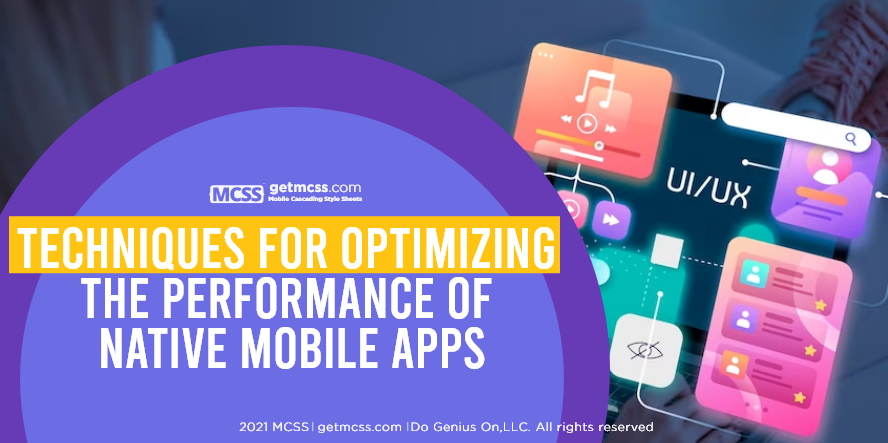Mobile applications have become an integral part of our daily lives. From social networking to online shopping, mobile apps have revolutionized the way we interact with the world. However, with the increasing complexity and demand for high-performing apps, developers face the challenge of optimizing their applications for better performance. This article will delve into various techniques for optimizing the performance of native mobile apps and how Mobile Cascading Style Sheets (MCSS) can play a pivotal role in this process.
Understanding Mobile App Performance
Before diving into the techniques, it's crucial to understand what mobile app performance entails. Performance, in the context of mobile apps, refers to the speed, responsiveness, and overall efficiency of an application. It's about how quickly an app can execute actions, load content, and respond to user interactions. Poor performance can lead to a frustrating user experience, resulting in lower user retention and negative reviews.
Techniques for Performance Optimization
There are several techniques that developers can employ to optimize the performance of their native mobile apps. These techniques can be broadly categorized into the following areas:
Efficient Data Handling
Data handling is a critical aspect of mobile app performance. Efficient data handling involves optimizing the way your app fetches, processes, and displays data. This can be achieved through techniques such as:
-
Data Caching: Store frequently accessed data in the device's local storage to reduce the need for network requests.
-
Lazy Loading: Load data only when it's needed, rather than loading all data at once.
-
Data Compression: Compress data to reduce the size of network requests and responses.
UI Optimization
The user interface (UI) is the first point of interaction between the user and your app. Therefore, it's essential to ensure that your UI is smooth and responsive. UI optimization techniques include:
-
Reducing Layout Complexity: Simplify your app's layout to reduce the time it takes to render the UI.
-
Optimizing Images: Compress images and use appropriate image formats to reduce load times.
-
Using Efficient Animations: Use hardware-accelerated animations to ensure smooth transitions and movements.
Efficient Event Handling
Event handling refers to how your app responds to user interactions such as clicks, swipes, and gestures. Efficient event handling can improve the responsiveness of your app. Techniques for efficient event handling include:
-
Debouncing and Throttling: These techniques limit the rate at which a function can fire, reducing the number of events that your app needs to handle.
-
Offloading Work to Background Threads: Perform intensive tasks in the background to keep the UI thread free and responsive.
Code Optimization
Code optimization involves improving the quality and efficiency of your code. Techniques for code optimization include:
-
Using Efficient Algorithms and Data Structures: Choose the right algorithms and data structures for your app's specific needs.
-
Reducing Memory Leaks: Regularly check for and eliminate memory leaks to prevent your app from consuming unnecessary resources.
-
Profiling and Benchmarking: Regularly profile and benchmark your app to identify and optimize performance bottlenecks.
Efficiency and Consistency with MCSS
MCSS allows developers to define styles for various UI components in a single file, typically named styles.mcss. This centralized approach to styling improves efficiency as developers can apply consistent styles across different parts of the app without having to duplicate code. It also ensures design consistency, as changes made to the styles in the MCSS file will be reflected across all the UI components that use those styles.
Real-time Updates with MCSS
One of the key benefits of using MCSS is the ability to make real-time updates to the app's styles. Developers can make changes to the MCSS file and see the effects immediately, ,without having to rebuild and redeploy the entire app. This feature can significantly speed up the development process and make it easier to experiment with different styles and designs.
Simplifying the Development Process with MCSS
By centralizing the style definitions, MCSS can simplify the overall development process. It provides a clear structure for the project and makes it easier to manage and maintain the code. Developers can quickly locate and update the styles for any given UI component, making the codebase easier to navigate and understand.
Integration of MCSS with Native IDEs
MCSS can be easily integrated into various native Integrated Development Environments (IDEs), such as Xcode for iOS development, Android Studio for Android development. This integration allows developers to work with MCSS in a familiar environment and take advantage of the various features and tools provided by these IDEs.
For example, in a typical project structure within an IDE, the MCSS file (styles.mcss) can be included within the resources or assets directory. The styles defined in this file can then be applied to the corresponding UI components, as illustrated in the following diagram:
Conclusion
Optimizing the performance of native mobile apps involves a combination of efficient data handling, UI optimization, efficient event handling, and code optimization. While these techniques can significantly improve the performance of your app, tools like MCSS can further enhance the development process by improving efficiency, enabling real-time updates, and simplifying the overall development process. By integrating MCSS into your development workflow, you can ensure design consistency across platforms, streamline your codebase, and ultimately build high-performing, user-friendly mobile apps.
The Future of Mobile App Performance Optimization
As mobile devices continue to evolve and become more powerful, so too will the techniques and tools used to optimize mobile app performance. Developers will need to stay abreast of the latest trends and technologies in order to continue delivering high-performing apps that meet the expectations of users.
One such trend is the increasing use of machine learning and artificial intelligence in mobile app development. These technologies can be used to predict user behavior, optimize resource allocation, and even automate some aspects of the development process.
Another trend is the growing importance of user experience (UX) in mobile app performance. As users become more discerning, developers will need to focus not just on the technical aspects of performance, but also on how performance impacts the overall user experience. This includes factors such as app responsiveness, load times, and the smoothness of animations and transitions.
Wrapping Up
In conclusion, optimizing the performance of native mobile apps is a multifaceted task that involves a range of techniques and tools. From efficient data handling and UI optimization to the use of advanced tools like MCSS, developers have a wealth of options at their disposal to create high-performing, user-friendly mobile apps.
By staying up-to-date with the latest trends and technologies, and by focusing on both the technical and experiential aspects of performance, developers can ensure that their apps meet the high expectations of today's mobile users.
Remember, a well-optimized app not only provides a better user experience but also ranks higher in app store search results, leading to higher visibility, more downloads, and ultimately, greater success in the competitive mobile app market.
For more information on MCSS and how it can enhance your mobile app development process, check out our comprehensive guide and latest press releases.
References
-
Mobile Cascading Style Sheets (MCSS). (2023). Retrieved from https://getmcss.com
-
MCSS Documentation. (2023). Retrieved from https://docs.getmcss.com/v1.0
-
Google Developers. (2023). Optimize Your App. Retrieved from https://developer.android.com/topic/performance
-
Apple Developer. (2023). Performance. Retrieved from https://developer.apple.com/performance
-
Microsoft Developer. (2023). Performance Best Practices for Mobile Apps. Retrieved from https://docs.microsoft.com/en-us/xamarin/cross-platform/deploy-test/performance
Mobile applications have become an integral part of our lives. (2023, February 28). LinkedIn. Retrieved May 30, 2023, from https://www.linkedin.com/pulse/mobile-applications-have-become-integral

